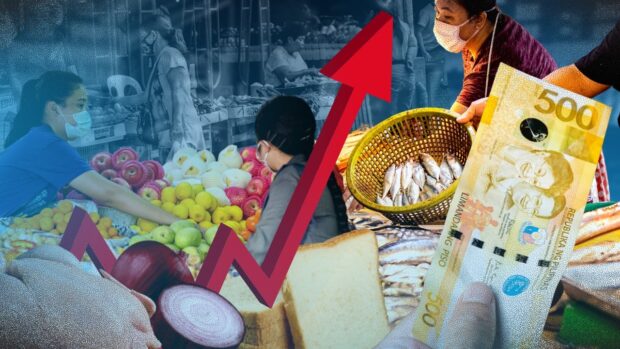
(COMPOSITE IMAGE BY JEROME CRISTOBAL FROM INQ FILE/STOCK PHOTOS)
MANILA, Philippines — The government is doing everything to manage the rising prices of goods and assessing strategies that can help taper headline inflation rates, Speaker Ferdinand Martin Romualdez said on Tuesday.
In a statement, Romualdez said that they fully acknowledge the struggles faced by Filipinos as the major driver of the 3.4 percent inflation rate in February 2024 was a sharp rise in food product cost.
“We fully acknowledge and empathize with the struggles faced by our Filipino families due to the escalating food prices, which have notably increased following the inflation rate’s rise to 3.4 percent in February from 2.8 percent in January, particularly impacted by a 4.8 percent surge in food inflation. We understand that these figures represent significant challenges for everyday living and the well-being of our communities,” Romualdez said.
“We reassure every Filipino that the government is unwavering in its dedication to navigating these challenges effectively. We are continuously assessing the situation and are ready to adapt our strategies to ensure that our policies promote sustainable growth and enhance the well-being of every Filipino,” he added.
According to Romualdez, one of the steps taken by the House of Representatives is to allocate a part of the 2024 national budget to social aid, including assistance for the near-poor or middle-class workers earning less than P23,000 per month.
“Notably, the House of Representatives has allocated a substantial budget for ayuda or relief subsidies in the 2024 General Appropriations Act. This decisive action demonstrates our commitment to protecting Filipinos from the adverse effects of global supply disruptions and ensuring that financial assistance is available to those who need it most,” he said.
“In response to the global increase in food prices, the government has been diligent in implementing strategic measures to enhance agricultural productivity and stabilize market conditions. The allocated ayuda or relief subsidy is part of our comprehensive approach to address the immediate needs of our citizens while fostering a more resilient agricultural sector,” he added.
The Philippine Statistics Authority (PSA) reported on Tuesday morning that the country’s four-month downtrend on inflation was snapped after prices accelerated by 3.4 percent due to higher food prices.
According to the PSA, the higher headline inflation fell within the projections of the Bangko Sentral ng Pilipinas (BSP). However, BSP managers are also concerned about higher transport charges, electricity rates, and costlier oil and domestic food prices.
Furthermore, there are fears that the rice situation would worsen due to the impact on food prices of the El Niño phenomenon.
Romualdez said that while it is not only the Philippines that feels the effects of higher inflation rates, the government is focused on assisting Filipinos by providing for the immediate needs of the people.
He also noted that the Philippines, despite the challenges, is doing better than other countries.
“While we recognize that many countries are grappling with higher inflation rates due to various global challenges, we remain focused on the immediate needs of our people. The global economic climate is indeed challenging, but our priority is the welfare and stability of our Filipino families,” Romualdez said.
“Despite these global and local economic pressures, the Philippines continues to demonstrate remarkable economic resilience, maintaining a growth trajectory that stands out in the Asia-Pacific region. However, we are mindful that economic growth must translate into tangible benefits for all sectors of society, particularly the underprivileged,” he added.